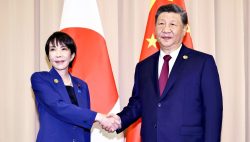Capital Reductions by Large Corporations: Moves to Deliberately Evade Taxes Cannot Be Overlooked
17:25 JST, November 23, 2023
Large corporations are increasingly reducing their capital so as to deliberately qualify as small and midsize companies under the tax system with the aim of sidestepping proper taxation. To maintain tax fairness, the government and ruling parties should take effective measures to prevent such moves.
For corporate enterprise tax — paid by companies to prefectural governments — the pro forma standard taxation system is used as one method to determine how much tax a firm must pay, based on capital and other factors. This approach was introduced in fiscal 2004 as a way to make tax revenues less susceptible to economic fluctuations and help stabilize local government finances.
Under the system, even loss-making corporations are required to pay a certain amount of tax. This is based on the idea that even companies operating in the red benefit from public infrastructure and administrative services, and should therefore be obligated to pay tax.
However, to protect small and midsize enterprises, the system is limited to large companies with capital of over ¥100 million. A number of companies have taken advantage of this preferential treatment and attempted to evade taxation by reducing their capital to ¥100 million or less.
According to the Internal Affairs and Communications Ministry, which oversees local taxes, about 30,000 large companies had capital exceeding ¥100 million in fiscal 2006. In fiscal 2021, however, this figure decreased to about 19,000.
This trend could undermine a key financial resource for prefectural governments. It also could violate the basic principle of the tax system: fairness.
Attention has been paid to the fact that the impact of the coronavirus pandemic prompted a large number of prominent companies — including travel agents JTB Corp. and H.I.S. Co., and conveyor-belt sushi chain Kappa Create Co. — to reduce their capital to ¥100 million or less.
In some cases, it is inevitable for companies to dip into their capital reserves to cover losses incurred due to deficits. However, according to a private credit research firm, of the about 1,200 companies that lowered their capital to ¥100 million or less in fiscal 2022, about 40% were profitable, based on their most recent financial results.
The fact that about 4,000 companies reduced their capital to just ¥100 million — the maximum amount not subject to taxation — from fiscal 2006 to fiscal 2021 is another indication of rampant tax evasion.
In response to this situation, the ministry’s Local Public Finance Council submitted an opinion letter to Internal Affairs and Communications Minister Junji Suzuki that included proposals to review the pro forma standard taxation system.
Companies keen to avoid their tax burden by reducing their capital often transfer the reduced amount to another item called “capital surplus” through various accounting manipulations. For this reason, the council’s letter proposed that the “total amount of capital and capital surplus” be used as the basis for taxation.
The ruling parties’ tax policy research panels intend to discuss the basis for taxation under the proposal and include the new basis in the year-end tax system reform outline.
However, small and midsize companies have voiced strong concerns about expanding the scope of taxation. It is hoped that efforts will be made to set appropriate levels for taxation so small and midsize firms with weak business foundations are not overly burdened.
(From The Yomiuri Shimbun, Nov. 23, 2023)
Top Articles in Editorial & Columns
-

Myanmar Will Continue Under Military Rule Even After Election, Ex-Ambassador Maruyama Says in Exclusive Interview
-

40 Million Foreign Visitors to Japan: Urgent Measures Should Be Implemented to Tackle Overtourism
-

Expansion of New NISA: Devise Ways to Build up Household Assets
-

China Criticizes Sanae Takaichi, but China Itself Is to Blame for Worsening Relations with Japan
-

Withdrawal from International Organizations: U.S. Makes High-handed Move that Undermines Multilateral Cooperation
JN ACCESS RANKING
-

Univ. in Japan, Tokyo-Based Startup to Develop Satellite for Disaster Prevention Measures, Bears
-

JAL, ANA Cancel Flights During 3-day Holiday Weekend due to Blizzard
-

China Confirmed to Be Operating Drilling Vessel Near Japan-China Median Line
-

China Eyes Rare Earth Foothold in Malaysia to Maintain Dominance, Counter Japan, U.S.
-

Japan Institute to Use Domestic Commercial Optical Lattice Clock to Set Japan Standard Time



















